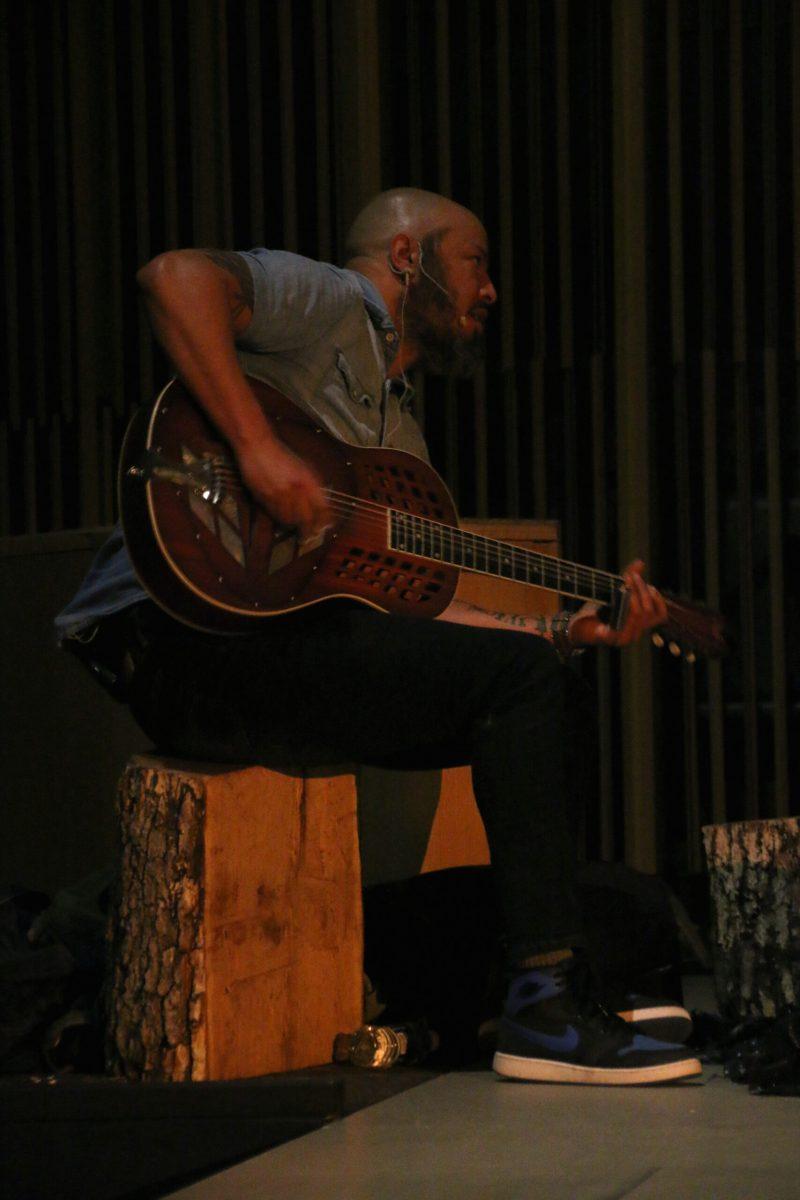
Imagine how it feels when a friend is telling you an engaging story.
The ambience of True/False Film Fest’s Campfire Stories event had the same feeling. At Campfire Stories, documentary directors retold their most memorable behind-the-scenes stories. It was an intimate experience that gave audience members a different perspective on some of the films featured at this year’s festival.
The event was held in the Firestone Baars Chapel at Stephens College, a venue distanced from the mostly downtown heart of True/False. Upon entering the chapel, guests were served s’mores made with graham crackers from Uprise Bakery and chocolate from The Candy Factory. They were also offered moonshine and moscato from The Wine Cellar & Bistro.
Once guests had their camp-themed provisions, they took their seats in the pews. With the help of simple technical effects, the room slowly transformed into an illusion of wilderness. Volunteers walked the aisles, burning sage to make the room smell like a campfire. Sounds of crickets, crackling firewood and owls hooting were played softly from speakers. The dim lighting and faux tealight candles drew the attention to the center of the room.
Seated next to a fake fire pit, Samuel James played gentle blues music on his steel guitar. James served as both the host and a storyteller, introducing each director and leading them into their stories with ease. His charismatic humor and banter made the scene feel more personal and less staged.
Director of _Won’t You Be My Neighbor?_, Morgan Neville, told his story first. In a somber yet inspiring tone, he spoke about his mother dying shortly before he started filming the documentary and how that influenced his experience creating the film.
“The film became my therapy,” Neville said to the crowd. “My story is in there as much as anyone else’s.”
Neville then asked audience members to be silent for 60 seconds and think about someone who made them the person they are today. Neville said he learned the importance of appreciating those who impacted you while exploring the life of Fred Rogers in his documentary.
“This was a gift from Fred to me, and I want to pass it on,” Neville said.
After Neville, Khalik Allah, director of _Black Mother_, told a humorous story about a filming mishap in Jamaica.
Allah had purchased a drone for aerial shots in the film. On the first day of using it, he and the other filmmakers lost sight of the drone in the trees and were unable to fly it back. Shortly after, he was approached by two teenagers who asked him if he was looking for his drone.
Allah, the two teenagers and a few crew members found themselves on a hunt for the drone. The teens climbed barefoot up bamboo trees in search of the missing drone. At one point, the group waded through a raging river, soaking their phones and production notes.
Allah was finally reunited with his drone when some local farmers told them where they’d seen it land. Allah told the farmers about the river crossing, and they were surprised. They told him there were often alligators in the rivers nearby.
Allah was shaken at the time but reflects on the experience with a smile.
“I feel like God’s hand was in that whole situation,” Allah said.
Director of _Westwood_, Lorna Tucker, told a similarly funny story about having to bring all of her children, including a newborn, to film with her. Tucker joked about being a workaholic and peppered in comedic anecdotes about breastfeeding during shoots.
Stephen Maing, director of _Crime + Punishment_, gave a provoking story on his use of hidden cameras and secret recordings in his film. While he debated using footage from unauthorized recordings, he shared the story that caused him to include them in his film.
Maing managed to capture footage of a young man leaving prison and being reunited with his family for the first time in a year. It was a deeply personal experience that made Maing realize why the shot needed to be in his film.
“The criminal justice system had not asked permission to take her son and a year of his childhood,” Maing said about the mother and family of the young man being released. “So I shouldn’t ask for [the criminal justice system’s] in telling our stories.”
Maing waited for 10 hours behind a door with a camera ready for the release and emotional reunion.
“If I could catch this, it would be real and communicate something to the world, and I got the shot,” Maing said.
The night wound down after Maing’s heartwarming tale of family reconnection. James picked up his steel guitar once again, and the audience members left the chapel to the sound of blues playing behind them.
_Edited by Brooke Collier | [email protected]_